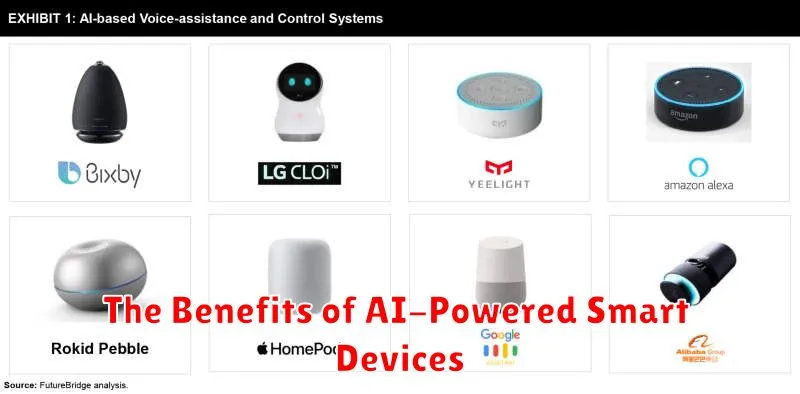The world of technology is constantly evolving, and artificial intelligence (AI) is at the forefront of this revolution. From self-driving cars to smart homes, AI is rapidly transforming how we live, work, and interact with the world around us. One particularly exciting area where AI is making a significant impact is in the development of smart devices. These devices are equipped with AI capabilities that allow them to learn, adapt, and perform tasks with greater efficiency and intelligence, offering numerous benefits to users.
However, with the rise of AI-powered smart devices comes a set of challenges that need to be addressed. While AI promises to enhance our lives, concerns about privacy, security, and ethical implications need to be carefully considered. This article delves into the benefits and challenges of implementing AI in smart devices, exploring the potential of this technology to revolutionize our lives while acknowledging the important considerations that must be addressed.
Understanding AI Integration in Smart Devices
The integration of Artificial Intelligence (AI) into smart devices has revolutionized how we interact with technology. AI empowers these devices with capabilities like voice recognition, image processing, predictive analytics, and personalized experiences. This integration allows smart devices to learn from user behavior, adapt to changing environments, and provide intelligent assistance.
AI algorithms analyze data collected from various sensors and user interactions, enabling devices to make informed decisions and perform tasks autonomously. This data-driven approach helps devices understand user preferences, anticipate needs, and provide tailored responses. For example, a smart thermostat can learn your preferred temperature settings and adjust accordingly, while a voice assistant can learn your language patterns and offer more relevant suggestions.
The integration of AI in smart devices is a complex process involving hardware, software, and data infrastructure. Devices require specialized processors and memory to handle AI computations, while software frameworks and algorithms are needed to implement AI functionalities. Moreover, the collection and analysis of user data are crucial for training AI models and enabling them to learn and improve over time.
It’s important to note that the integration of AI in smart devices raises ethical considerations regarding data privacy and security. Devices collecting user data need robust security measures to protect personal information from unauthorized access. Transparency in data collection and usage is essential to build trust with users and ensure ethical AI practices.
The Benefits of AI-Powered Smart Devices

AI-powered smart devices are transforming the way we live and work, bringing numerous benefits across various domains.
Enhanced Convenience: AI empowers smart devices to learn our preferences and habits, providing personalized experiences and automation. For example, smart home devices can adjust lighting and temperature based on our schedules, while smart assistants can proactively remind us of appointments or fetch information.
Increased Efficiency: AI optimizes device performance and efficiency. Smart appliances can adjust energy consumption based on usage patterns, while AI-powered home security systems can identify potential threats and react proactively.
Improved Safety: AI contributes to a safer environment. Smart cars leverage AI for autonomous driving and accident prevention, while AI-powered medical devices can monitor vital signs and detect anomalies.
Personalized Experiences: AI tailors devices to our specific needs and preferences. Streaming services use AI to recommend content, while fitness trackers provide customized workout plans based on individual fitness goals.
Enhanced Accessibility: AI makes technology more accessible to individuals with disabilities. For instance, AI-powered voice assistants and screen readers allow visually impaired individuals to interact with devices more easily.
Challenges in Implementing AI in Home Automation
While the benefits of incorporating AI into home automation are undeniable, there are several challenges that need to be addressed for widespread adoption. One key challenge is data privacy. AI systems require vast amounts of data to learn and improve, raising concerns about how user data is collected, stored, and used. Ensuring data security and preventing unauthorized access is paramount.
Another challenge is interoperability. With various manufacturers offering their own smart home ecosystems, devices from different brands often struggle to communicate with each other. This lack of standardization hinders seamless integration and limits the potential of AI-driven automation.
Cost can also be a barrier to entry. Implementing sophisticated AI systems for home automation can be expensive, particularly for users with limited budgets. The cost of hardware, software, and ongoing maintenance can make it challenging for some to enjoy the benefits of AI-powered smart homes.
Furthermore, technical complexity can pose a hurdle. Configuring and maintaining AI-driven systems may require specialized technical skills that many users lack. Simplifying the user interface and providing intuitive tools can help overcome this challenge.
Finally, trust and reliability are crucial aspects. Users must have confidence that AI systems will function as intended and make safe, reliable decisions. Addressing potential bias in algorithms and ensuring transparency in AI operations are essential for building trust.
AI and Smart Security Systems: A Perfect Match
The integration of Artificial Intelligence (AI) into smart security systems is revolutionizing the way we protect our homes and businesses. This powerful combination offers a plethora of benefits, enhancing security measures and creating a more proactive and intelligent approach to safeguarding our assets.
One of the most significant advantages of AI in smart security is its ability to analyze vast amounts of data in real-time. By leveraging machine learning algorithms, AI can identify patterns and anomalies that may indicate potential threats, such as unusual movements, suspicious activities, or even changes in environmental conditions. This predictive capability allows for early detection and intervention, preventing incidents before they escalate.
AI-powered security systems also excel at personalization. They can learn user preferences and behavior patterns, tailoring security measures to individual needs. For example, AI can adjust lighting schedules based on occupancy, optimize temperature settings for energy efficiency, and even recognize familiar faces to grant access while deterring unauthorized individuals.
However, the implementation of AI in smart security systems comes with certain challenges. One significant concern is data privacy. AI systems require access to personal data for effective operation, raising concerns about potential misuse or breaches. It is crucial to ensure robust security measures and transparent data handling practices to address these concerns.
Another challenge is algorithm bias. AI algorithms can be susceptible to biases inherent in the training data, potentially leading to discriminatory or unfair outcomes. It is essential to develop and deploy AI systems that are fair, transparent, and accountable, ensuring that they do not perpetuate existing social inequalities.
Despite these challenges, the benefits of integrating AI into smart security systems outweigh the risks. By embracing AI’s potential while addressing its limitations, we can create a more secure and intelligent future where technology empowers us to protect our valuable assets.
The Future of AI in Smart Devices
The integration of Artificial Intelligence (AI) into smart devices is rapidly transforming our lives. From voice assistants like Siri and Alexa to personalized recommendations on streaming services, AI is making our devices smarter and more intuitive. But what does the future hold for AI in smart devices?
The future of AI in smart devices is bright, with the potential to revolutionize many aspects of our lives.
One key area of growth is in personalization. AI can learn our preferences and habits, tailoring our experiences to our individual needs. Imagine a smart home that anticipates your needs before you even ask, or a fitness tracker that adjusts your workout routines based on your progress and goals.
Another exciting area is predictive maintenance. AI-powered devices can monitor their own health and predict potential issues before they arise. This can lead to fewer breakdowns, reduced downtime, and increased efficiency.
However, there are also challenges associated with the widespread adoption of AI in smart devices.
One key concern is privacy. As AI collects more data about our habits and preferences, it raises questions about how this information is used and protected.
Another challenge is security. AI-powered devices are more susceptible to hacking and cyberattacks. Ensuring the security of these devices is crucial to protect sensitive information.
Despite these challenges, the future of AI in smart devices is undoubtedly bright. As AI technology continues to evolve, we can expect to see even more innovative and transformative applications in the years to come.
Case Studies: AI-Driven Home Automation
The integration of AI in smart devices is rapidly changing the way we live. One of the most visible applications of this technology is in the field of home automation. Here are some case studies that demonstrate the benefits and challenges of AI-driven home automation:
1. Nest Learning Thermostat
Nest Learning Thermostat is a prime example of AI-powered home automation. It learns your preferences over time, such as preferred temperature settings and daily routines, and adjusts the thermostat accordingly. This results in significant energy savings, comfort, and convenience.
Benefits:
- Energy efficiency
- Improved comfort
- Convenience
Challenges:
- Initial setup and learning process can take time
- Privacy concerns related to data collection
2. Amazon Alexa and Google Assistant
Voice assistants like Amazon Alexa and Google Assistant have revolutionized home automation. They allow users to control various smart devices, such as lights, appliances, and entertainment systems, using voice commands.
Benefits:
- Hands-free control of smart devices
- Seamless integration with various devices and services
- Personalized experiences based on user preferences
Challenges:
- Privacy concerns related to voice data collection
- Limited compatibility with certain devices and services
3. Robotic Vacuum Cleaners
Robotic vacuum cleaners, equipped with AI-powered navigation and obstacle avoidance capabilities, are increasingly popular. They can autonomously clean floors, adapting to different room layouts and furniture arrangements.
Benefits:
- Automated cleaning, freeing up time for other activities
- Improved cleaning efficiency and thoroughness
- Reduced manual labor and effort
Challenges:
- Can struggle with complex or cluttered environments
- May require occasional manual intervention for optimal performance
These case studies highlight the potential of AI in transforming the way we interact with our homes. While there are benefits and challenges, it is evident that AI-driven home automation is rapidly evolving, with exciting advancements on the horizon.

